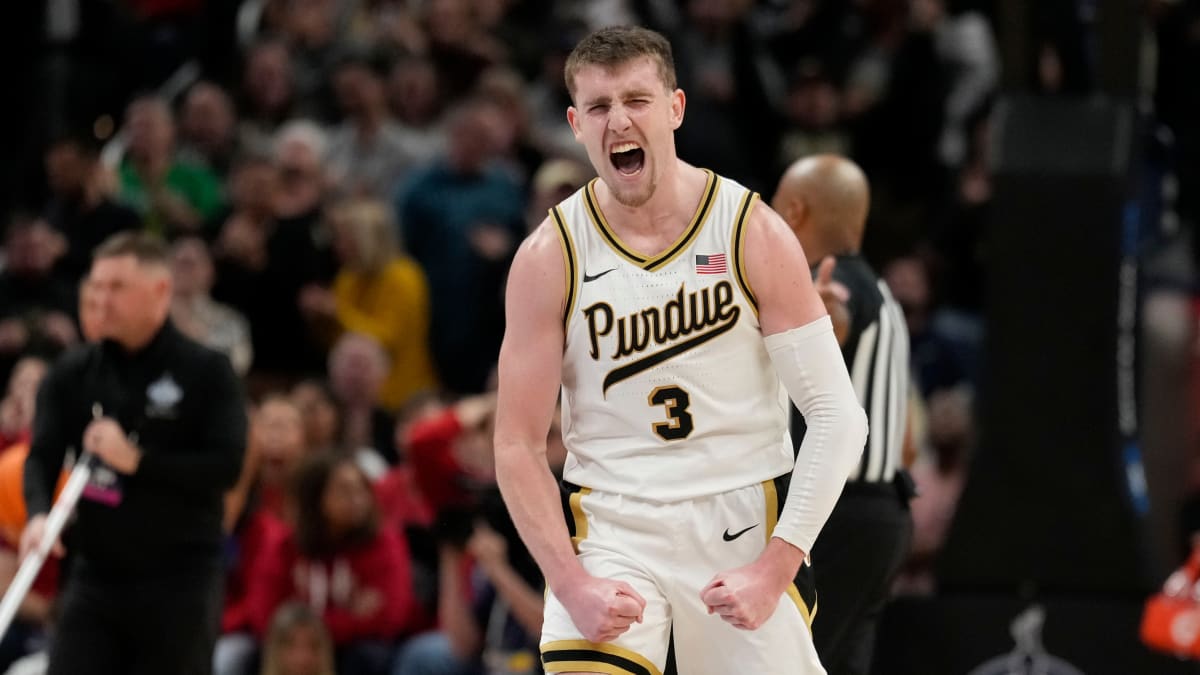The tyranny of the NCAA tournament is merciless in college basketball. What happens across three weeks in March and April rule, with the power to nullify everything that came before them. Disappointing seasons can be rescued in March, but great seasons can be wiped out as well.
Purdue and Arizona know that as well as any men’s programs in America. The two flopped disastrously last March, and until they get back to that stage again—and win—nothing will heal those wounds. The cruel fact of the matter is that the two teams are off to great starts and played a great game here against each other Saturday … and it means very little.
Third-ranked Purdue (10–1) defeated No. 1 Arizona (8–1), 92-84, in Indianapolis. The court was full of outstanding players making outstanding plays for teams with no glaring weaknesses. The coaching by Matt Painter of the Boilermakers and Tommy Lloyd of the Wildcats was top shelf. It’s the kind of game that is routinely referred to as a March preview.
Except Purdue and Arizona have found ways to play far below this level come March. They’ve found ways to self-destruct. Their seasons have been known to end in flames, not in fame.
Last March, No. 2 seed Arizona disintegrated against No. 15 Princeton. The Wildcats went scoreless for the last 4:45, an elite offensive team seizing up badly, its five-point lead turning into a four-point loss. It was really bad.
The next day, Purdue did something far worse. The Boilermakers expanded the saddest club in the sport—previously occupied only by 2018 Virginia—by losing as a No. 1 seed to No. 16 Fairleigh Dickinson. It was a disaster beyond description. FDU was ranked 299th in Division I by Ken Pomeroy coming into the game, making the Knights the worst team to ever win a game in the main bracket of the Big Dance.
And for both programs, this was only the latest March meltdown. Lloyd’s first Arizona team earned a No. 1 seed in 2022 and was bounced in the Sweet 16 by No. 5 seed Houston, 72–60, in a game that was rarely close. Painter’s Purdue teams have underachieved in the tournament several times, most notably losing in the first round as a No. 4 seed (‘21 to North Texas) and a No. 5 seed (‘16 to Arkansas-Little Rock).
So both Arizona and Purdue are playing under a burden of proof that cannot be lifted until they do it when it matters most. Everything until then is just preamble and prelude. That’s the unfair world in which they reside.
Unfortunately, that reduces the impact of Saturday’s scintillating competition. Both teams look good—better than last year’s versions. Both teams played well against each other, with elite skill and size and competitiveness on display. There is reason to believe this season will end differently for both.
For the Boilermakers, the performance by guards Fletcher Loyer and Braden Smith was Exhibit A. The two sophomores are a year older, wiser and more fearless. They combined to score 53 points against Arizona, making nine three-pointers and punishing the Wildcats for their natural inclination to double-team tower-of-power center Zach Edey.

AJ Mast/AP
In the disaster against FDU, Loyer and Smith looked like weak links—especially Smith. They started last year as freshmen but struggled at season’s end. Smith made just two of 10 shots and committed seven turnovers against the Knights. Loyer was 4-for-10 from the field with three turnovers. They struggled defensively as well.
“All we want to do is go out and win the game,” Loyer said Saturday. “[The FDU loss] is something we don’t want to feel again, something that sat with us all summer.”
Painter’s program has been built on bringing in players who aren’t necessarily five-star recruits but fit the way he wants to play. Loyer, who was not a Top-100 national recruit, and Smith, who was a three-star prospect, fit the program. But after last season’s first-round exit, the pair’s performances reinforced previous doubts about whether Purdue was athletic enough to make Final Fours and compete for national championships.
To address that, Painter brought in new guards in Southern Illinois transfer Lance Jones and freshman Myles Colvin. But ultimately it was Smith and Loyer each playing 36 minutes against the Wildcats. They’re still the guards at the forefront of Painter’s grander plan.
For Arizona, the year-over-year improvement primarily has come on defense. The Wildcats are tougher inside the arc and better on the defensive glass. The biggest addition there is San Diego State transfer Keshad Johnson, who has imported some of the hard edge the Aztecs played with in reaching the national championship game last year.
Lloyd also brought in North Carolina transfer Caleb Love, whose time in Chapel Hill had many high points but also a lot of frustration. Love was criticized for unwise, volume shooting, turnovers in bunches and defensive indifference. But Love was great against Purdue, scoring a season-high 29 points with just one turnover. Johnson, meanwhile, had a career-high 24 points.
All things considered, losing a close game in a road atmosphere against a high-level opponent didn’t bother Lloyd much. “I’m not trying to be No. 1 in December,” he said. “You guys decide that, not me. … I don’t know what’s going to happen with Purdue in the tournament. I don’t know what’s going to happen with us. But both programs have taken steps in the right direction to be successful.”
Said Painter of Arizona: “They’re going to beat a lot of teams. And they’re going to be there at the end.”
Where Arizona is at the end is what matters most. Same for Purdue. They’re both well on their way to high seeds yet again, but they also know that seeding only matters on Selection Sunday. After that, everyone in the bracket has the same chance.
These two teams have to deliver come March. Everything before then—even a big-time game against each other—is simply positioning.







